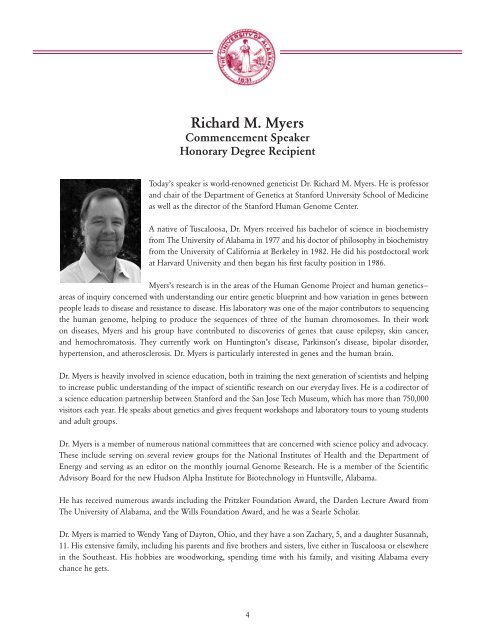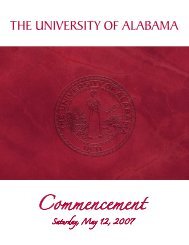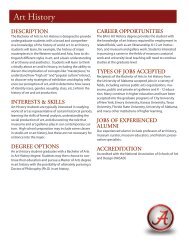Commencement - The University of Alabama
Commencement - The University of Alabama
Commencement - The University of Alabama
Create successful ePaper yourself
Turn your PDF publications into a flip-book with our unique Google optimized e-Paper software.
Richard M. Myers<br />
<strong>Commencement</strong> Speaker<br />
Honorary Degree Recipient<br />
Today’s speaker is world-renowned geneticist Dr. Richard M. Myers. He is pr<strong>of</strong>essor<br />
and chair <strong>of</strong> the Department <strong>of</strong> Genetics at Stanford <strong>University</strong> School <strong>of</strong> Medicine<br />
as well as the director <strong>of</strong> the Stanford Human Genome Center.<br />
A native <strong>of</strong> Tuscaloosa, Dr. Myers received his bachelor <strong>of</strong> science in biochemistry<br />
from <strong>The</strong> <strong>University</strong> <strong>of</strong> <strong>Alabama</strong> in 1977 and his doctor <strong>of</strong> philosophy in biochemistry<br />
from the <strong>University</strong> <strong>of</strong> California at Berkeley in 1982. He did his postdoctoral work<br />
at Harvard <strong>University</strong> and then began his first faculty position in 1986.<br />
Myers’s research is in the areas <strong>of</strong> the Human Genome Project and human genetics—<br />
areas <strong>of</strong> inquiry concerned with understanding our entire genetic blueprint and how variation in genes between<br />
people leads to disease and resistance to disease. His laboratory was one <strong>of</strong> the major contributors to sequencing<br />
the human genome, helping to produce the sequences <strong>of</strong> three <strong>of</strong> the human chromosomes. In their work<br />
on diseases, Myers and his group have contributed to discoveries <strong>of</strong> genes that cause epilepsy, skin cancer,<br />
and hemochromatosis. <strong>The</strong>y currently work on Huntington’s disease, Parkinson’s disease, bipolar disorder,<br />
hypertension, and atherosclerosis. Dr. Myers is particularly interested in genes and the human brain.<br />
Dr. Myers is heavily involved in science education, both in training the next generation <strong>of</strong> scientists and helping<br />
to increase public understanding <strong>of</strong> the impact <strong>of</strong> scientific research on our everyday lives. He is a codirector <strong>of</strong><br />
a science education partnership between Stanford and the San Jose Tech Museum, which has more than 750,000<br />
visitors each year. He speaks about genetics and gives frequent workshops and laboratory tours to young students<br />
and adult groups.<br />
Dr. Myers is a member <strong>of</strong> numerous national committees that are concerned with science policy and advocacy.<br />
<strong>The</strong>se include serving on several review groups for the National Institutes <strong>of</strong> Health and the Department <strong>of</strong><br />
Energy and serving as an editor on the monthly journal Genome Research. He is a member <strong>of</strong> the Scientific<br />
Advisory Board for the new Hudson Alpha Institute for Biotechnology in Huntsville, <strong>Alabama</strong>.<br />
He has received numerous awards including the Pritzker Foundation Award, the Darden Lecture Award from<br />
<strong>The</strong> <strong>University</strong> <strong>of</strong> <strong>Alabama</strong>, and the Wills Foundation Award, and he was a Searle Scholar.<br />
Dr. Myers is married to Wendy Yang <strong>of</strong> Dayton, Ohio, and they have a son Zachary, 5, and a daughter Susannah,<br />
11. His extensive family, including his parents and five brothers and sisters, live either in Tuscaloosa or elsewhere<br />
in the Southeast. His hobbies are woodworking, spending time with his family, and visiting <strong>Alabama</strong> every<br />
chance he gets.<br />
4







